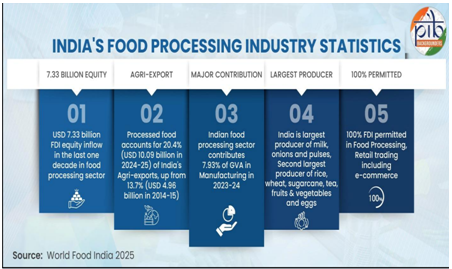

25th September 2025 (10 Topics)
Context:
World Food India (WFI) 2025, organized by the Ministry of Food Processing Industries, will be held from 25–28 September 2025 at Bharat Mandapam, New Delhi, with participation from 90+ countries and 2,000+ exhibitors, showcasing India as a Global Food Hub.
India’s Food Processing at Global Crossroads
Evolution and Significance of WFI
- Inception and Growth: Launched in 2017, WFI has grown into a premier platform for global stakeholders to engage with India’s food processing sector.
- Global Participation: The 2025 edition is the largest so far, with New Zealand and Saudi Arabia as Partner Countries, and Japan, UAE, Vietnam, and Russia as Focus Countries.
- Strategic Positioning: WFI positions India not only as a market but also as a trusted partner in global food security and sustainability.
India’s Strengths in Food Sector

- Agricultural Base: India is the largest producer of milk, onions, pulses, and the second-largest producer of rice, wheat, sugarcane, tea, fruits, vegetables, and eggs.
- Economic Contribution: The food processing sector contributes significantly to GDP, employment, and exports; processed food accounted for 20.4% of agri-exports in 2024–25.
- Employment Impact: About 23 million workers in registered units and 4.68 million in the unregistered sector are engaged in food processing.
Government Initiatives and Policies
Infrastructure Development: Establishment of 24 Mega Food Parks, 22 agro-processing clusters, 289 cold chain projects, and 305 processing and preservation units.
- Policy Reforms: 100% FDI in food processing, NABARD’s ?2,000 crore fund for food parks, and ease-of-doing-business reforms through online schemes.
- Schemes:
- PMKSY (infrastructure, supply chains).
- PMFME Scheme (support to micro-enterprises, SHGs).
- PLI Scheme for Food Processing (?10,900 crore outlay).
- PLI Scheme for Millets-based Products (RTE/RTC millet products).
Strategic Objectives of WFI 2025
- Showcasing India as Global Food Hub: Bridging agriculture, technology, processing, and exports.
- Forging Partnerships: B2B, B2G, and G2G meetings for trade and investment.
- Knowledge Exchange: Global Food Regulators Summit (FSSAI) and India International Seafood Show (SEAI) to harmonize food standards and expand seafood exports.
- Innovation and Start-ups: Startup Grand Challenge, Digital Showcase, and specialized pavilions for HoReCa, alcoholic beverages, and pet food.
Challenges and Concerns
- Post-Harvest Losses: Despite progress, wastage in perishable produce remains high.
- Small-Scale Sector Constraints: Informal and unregistered units face limited credit access and technology adoption barriers.
- Global Competition: India must align food safety and quality standards with international norms to remain competitive.
Way Forward
- Strengthen Cold Chain and Logistics: Expand integrated cold chains and smart supply systems to minimize post-harvest losses.
- Boost R&D and Technology Adoption: Invest in innovation for value-added products, fortified foods, and sustainable packaging.
- Enhance Global Branding: Promote Indian food products such as millets, spices, and seafood under “Make in India” branding.
- Inclusive Growth: Strengthen support for MSMEs, SHGs, and farmers’ producer organizations to enhance rural prosperity.
- Sustainability Focus: Promote climate-smart agriculture and nutrition-sensitive food products in line with Vision 2047.
More Articles


